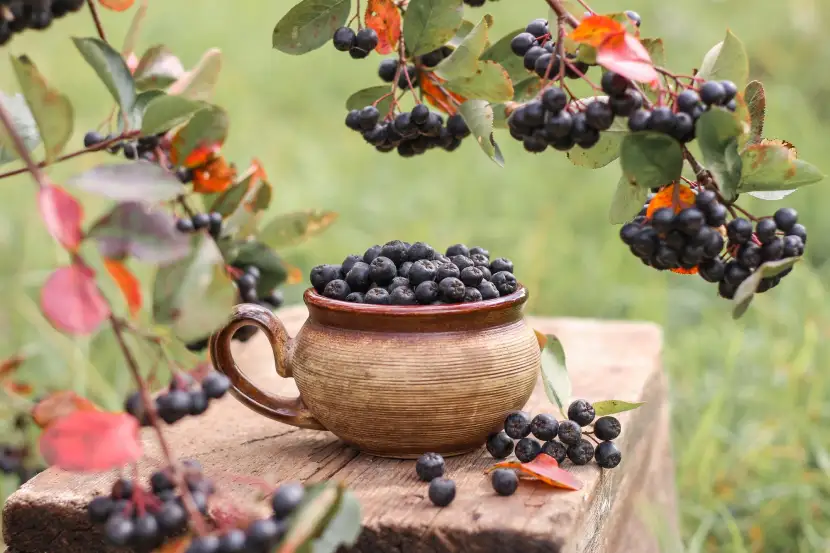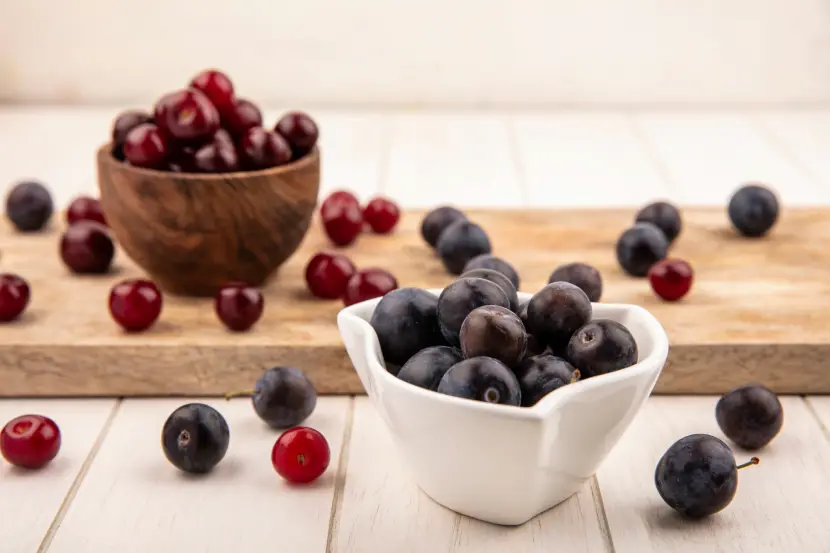What is Aronia Melanocarpa?
Understanding Black Chokeberry
If you’re exploring the world of superfoods, you’ve likely encountered Aronia melanocarpa, commonly known as black chokeberry. This remarkable berry has gained significant attention in the health and wellness community, and for good reason. Native to North America, these berries have been utilized for centuries by indigenous peoples for their nutritional and medicinal properties.
What makes these berries particularly interesting is their incredibly rich concentration of antioxidants and beneficial compounds. When you first encounter them, you’ll notice their distinctive dark purple, almost black color – a visual indicator of their high anthocyanin content.
Plant Characteristics and Growth
The black chokeberry plant is known for its hardy nature and adaptability. While understanding the botanical aspects isn’t crucial for health benefits, knowing the basics helps you identify quality sources. These shrubs typically reach a moderate height of 3-6 feet, making them easily manageable for cultivation. Their compact size makes them ideal for various growing environments, and you’ll find that the low scape varieties of Aronia melanocarpa are particularly popular for their maintenance-friendly characteristics.

The Nutritional Profile of Aronia Melanocarpa
Key Nutrients
When it comes to nutritional density, these berries are truly remarkable. In every serving, you’ll find:
- High levels of Vitamin C, supporting immune function
- Significant amounts of Vitamin K, essential for blood clotting
- Manganese for bone health and wound healing
- Dietary fiber for digestive health
- Essential minerals including iron and zinc
Antioxidant Content
What truly sets Aronia melanocarpa apart is its exceptional antioxidant profile. These berries contain:
- Anthocyanins: The compounds responsible for their dark color
- Proanthocyanidins: Powerful antioxidants that support cardiovascular health
- Quercetin: A flavonoid known for its anti-inflammatory properties
- Polyphenols: Compounds that help protect cells from oxidative stress
Health Benefits and Scientific Evidence
Cardiovascular Health
Research has shown that regular consumption of these berries may support heart health through multiple mechanisms:
- Helping maintain healthy blood pressure levels
- Supporting healthy cholesterol levels
- Promoting healthy blood vessel function
- Reducing oxidative stress on cardiovascular tissues
Immune System Support
The high concentration of antioxidants and vitamins in Aronia melanocarpa makes them valuable for immune support:
- Vitamin C content helps strengthen your immune response
- Antioxidants support your body’s natural defense mechanisms
- Anti-inflammatory properties help maintain immune system balance
Blood Sugar Management
Emerging research suggests potential benefits for blood sugar regulation:
- May help support healthy insulin sensitivity
- Could assist in maintaining stable blood glucose levels
- Fiber content helps slow sugar absorption
Cultivation and Harvesting
Growing Requirements
For those interested in natural food sources, understanding how these berries are grown can help you better appreciate their quality. The Aronia melanocarpa plant thrives in various soil conditions but prefers well-drained, slightly acidic environments. While professional cultivation ensures consistent quality, many health enthusiasts are discovering the satisfaction of growing their own plants, particularly the compact varieties that fit well in home gardens.
Seasonal Considerations
The harvesting season typically runs from late summer to early fall, when the berries reach their peak nutritional content. Wild-crafted Aronia melanocarpa berries are traditionally harvested after the first frost, as this can help reduce their astringency while maintaining their beneficial properties.
Forms and Preparation Methods
Fresh Berries
Fresh black chokeberry (Aronia melanocarpa) can be consumed directly, though many find their taste quite astringent. This is actually a sign of their high antioxidant content. To make them more palatable, you might consider:
- Mixing them with other fruits in smoothies
- Adding them to breakfast cereals or yogurt
- Incorporating them into baked goods
- Using them in homemade preserves or jams
Supplements and Extracts
If you’re looking for concentrated benefits, Aronia melanocarpa is available in various supplement forms:
- Powder supplements for easy mixing
- Liquid extracts for quick absorption
- Capsules for convenient daily intake
- Dried berries for flexible use
Recommended Dosage
While there’s no standardized dosage for these berries, typical recommendations include:
- Fresh berries: 30-60 grams daily
- Dried berries: 10-20 grams daily
- Supplements: Follow manufacturer’s guidelines, typically ranging from 300-1500mg daily
- Extracts: Varies by concentration, follow product instructions
Incorporating Aronia Melanocarpa into Your Diet
Daily Consumption Tips
To maximize the benefits of these nutrient-rich berries, consider these practical tips:
- Start with small amounts to allow your body to adjust
- Combine with vitamin C-rich foods to enhance absorption
- Include them in your morning routine for consistent intake
- Store properly to maintain freshness and potency
Recipe Ideas
Here are some creative ways to incorporate these berries into your daily diet:
- Morning power smoothie: Blend with banana, spinach, and almond milk
- Antioxidant trail mix: Mix dried berries with nuts and seeds
- Superfood breakfast bowl: Top your oatmeal or yogurt
- Healthy desserts: Use in sugar-free baking or frozen treats
Market Availability and Product Types
Fresh and Frozen Options
The availability of fresh Aronia melanocarpa berries varies by season and location. You can find them:
- At local farmers’ markets during harvest season
- In specialty health food stores
- Through online retailers (often frozen)
- At some conventional supermarkets in the produce or frozen section
Supplement Forms
When choosing supplements, consider these common formats:
- Freeze-dried powder for maximum nutrient preservation
- Standardized extracts for consistent potency
- Organic certifications for quality assurance
- Combined formulations with complementary ingredients
Consumer Guide: Choosing Quality Products
What to Look For
When selecting Aronia melanocarpa products, quality indicators play a crucial role in ensuring you receive optimal health benefits. The color of fresh or frozen berries should be uniformly dark purple to black, indicating high antioxidant content. For supplements derived from black chokeberry, look for products that clearly state their concentration levels and undergo third-party testing. Organic certification can provide additional assurance about cultivation practices and product purity.
Storage Tips
Proper storage significantly impacts the therapeutic potential of these berries. Fresh Aronia melanocarpa berries can maintain their nutritional value for up to two weeks when refrigerated in an airtight container. If you opt for frozen berries, they can retain their beneficial properties for up to six months when stored at proper freezing temperatures. Supplement forms generally have a longer shelf life but should be kept in a cool, dry place away from direct sunlight.
Target Demographics
Age Groups
The versatility of black chokeberry makes it suitable for various age groups. Adults seeking preventive health measures often incorporate Aronia melanocarpa into their wellness routines. Younger individuals, particularly those interested in natural health solutions, may find these berries appealing for their antioxidant properties and potential immune-supporting benefits. Elderly individuals might particularly benefit from the cardiovascular and cognitive support these berries may offer.
Health Conditions
Research suggests that different populations may benefit from these berries in various ways. Athletes and physically active individuals often appreciate the recovery-supporting properties of Aronia melanocarpa extracts. Those managing blood sugar levels might find the berries’ natural compounds helpful as part of their overall health strategy. However, it’s essential to consult healthcare providers before using any new supplement, especially for those with existing medical conditions or taking medications.

Safety and Precautions
Potential Side Effects
While generally considered safe, some individuals may experience mild digestive discomfort when first introducing these berries into their diet. The high tannin content of Aronia melanocarpa can cause temporary mouth dryness or mild constipation in sensitive individuals. Starting with small amounts and gradually increasing intake can help minimize these effects. Most people find that their bodies adjust to regular consumption over time.
Drug Interactions
Understanding potential interactions is crucial for safe consumption. These berries may interact with certain blood-thinning medications due to their high vitamin K content. They might also affect blood sugar levels, which is particularly relevant for individuals taking diabetes medications. Always inform your healthcare provider about your use of any supplement, including Aronia melanocarpa products, to ensure safe integration with your current health regimen.
Sustainability and Environmental Impact
Cultivation Practices
Modern cultivation of these berries increasingly emphasizes sustainable practices. Traditional farming methods for black chokeberry often require minimal pesticide use, as the plants naturally resist many common pests. The growing interest in organic Aronia melanocarpa has led to the development of more environmentally conscious farming techniques, benefiting both consumers and ecosystems.
Environmental Benefits
Beyond their health benefits, these plants contribute positively to environmental sustainability. Their hardy nature and ability to thrive in various conditions make them excellent candidates for soil conservation projects. The plants support local pollinators and contribute to biodiversity in agricultural settings. This environmental consciousness adds another layer of appeal for health-conscious consumers who also prioritize ecological responsibility.
FAQs
Common Questions
Q: What makes Aronia melanocarpa different from other berries?
A: These berries stand out due to their exceptionally high antioxidant content, particularly anthocyanins and polyphenols, which exceed levels found in most other common berries. Their unique combination of compounds and nutrients makes them particularly valuable for cardiovascular and immune system support.
Q: Can I eat black chokeberry raw?
A: While Aronia melanocarpa berries are completely edible in their raw form, many people find their taste quite astringent. This astringency comes from their high tannin content. Most consumers prefer to incorporate them into recipes or take them in supplement form to make them more palatable.
Q: How long does it take to see health benefits?
A: The timeline for experiencing benefits varies among individuals. While some antioxidant effects begin immediately upon consumption, noticeable health benefits typically develop over weeks or months of regular consumption. Consistency in taking Aronia melanocarpa products is key to experiencing optimal results.
Q: Are there any age restrictions for consumption?
A: These berries are generally considered safe for all age groups. However, due to their potent properties, it’s advisable to consult with healthcare providers before giving concentrated supplements to children or if you’re pregnant or nursing.
Usage Concerns
Q: What’s the best time of day to consume these berries or supplements?
A: The timing of Aronia melanocarpa consumption can be flexible based on your preference. However, many people find taking them with breakfast helps establish a consistent routine. If using supplements, following the manufacturer’s recommendations for optimal timing is advisable.
Q: Can I take them with other supplements?
A: While black chokeberry products generally work well with other supplements, it’s wise to space out their consumption throughout the day. This approach helps maximize absorption and reduce any potential interactions.
Q: How should I start incorporating them into my diet?
A: Begin with small amounts of Aronia melanocarpa and gradually increase your intake. This approach helps your body adjust and minimizes any potential digestive discomfort. Starting with berries in smoothies or mixed with other foods can make the introduction more pleasant.
Conclusion
The growing interest in Aronia melanocarpa reflects a broader trend toward natural, nutrient-dense foods in modern health practices. These berries offer a compelling combination of antioxidant properties, nutritional benefits, and versatility in usage. While research continues to uncover new potential benefits, existing evidence supports their role in supporting cardiovascular health, immune function, and overall wellness.
When choosing to incorporate these berries into your health routine, remember that quality matters. Whether you opt for fresh berries, supplements, or other forms, ensure you’re selecting products from reputable sources. Start slowly, listen to your body’s response, and adjust your consumption accordingly.
The sustainability aspect of black chokeberry cultivation adds another positive dimension to their appeal. As more people discover these beneficial berries, their role in both personal health and environmental stewardship continues to grow. While they shouldn’t be viewed as a miracle cure, Aronia melanocarpa represents a valuable addition to a well-rounded, health-conscious lifestyle.
Remember that individual responses to any dietary addition can vary. While these berries offer impressive potential benefits, they work best as part of an overall healthy diet and lifestyle. Consider consulting with healthcare professionals when making significant changes to your dietary routine, particularly if you have existing health conditions or take medications.



